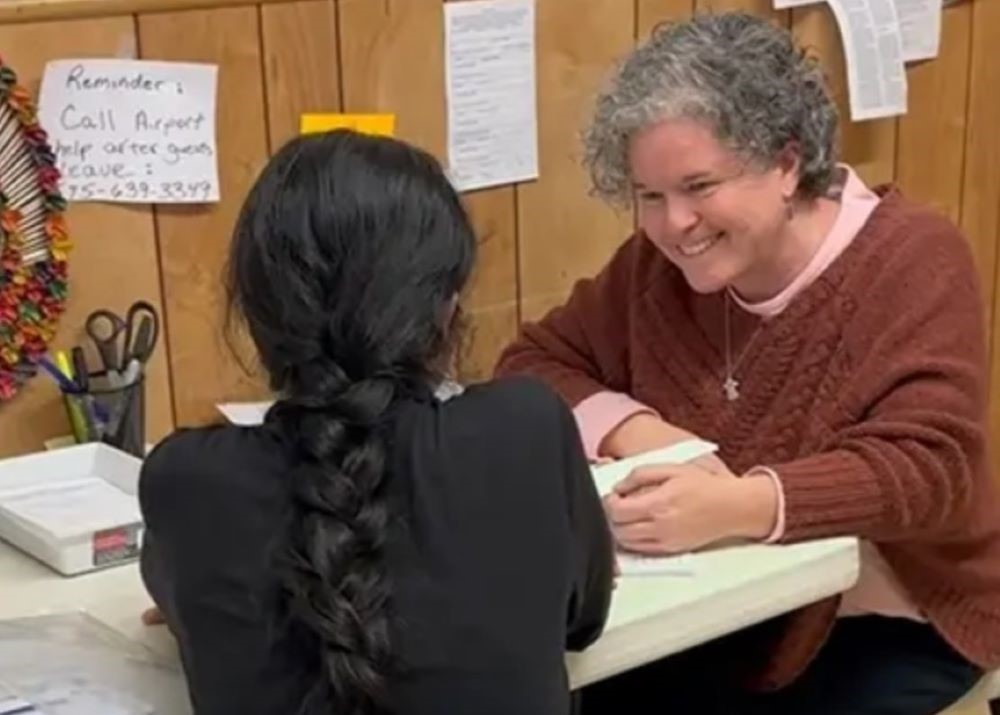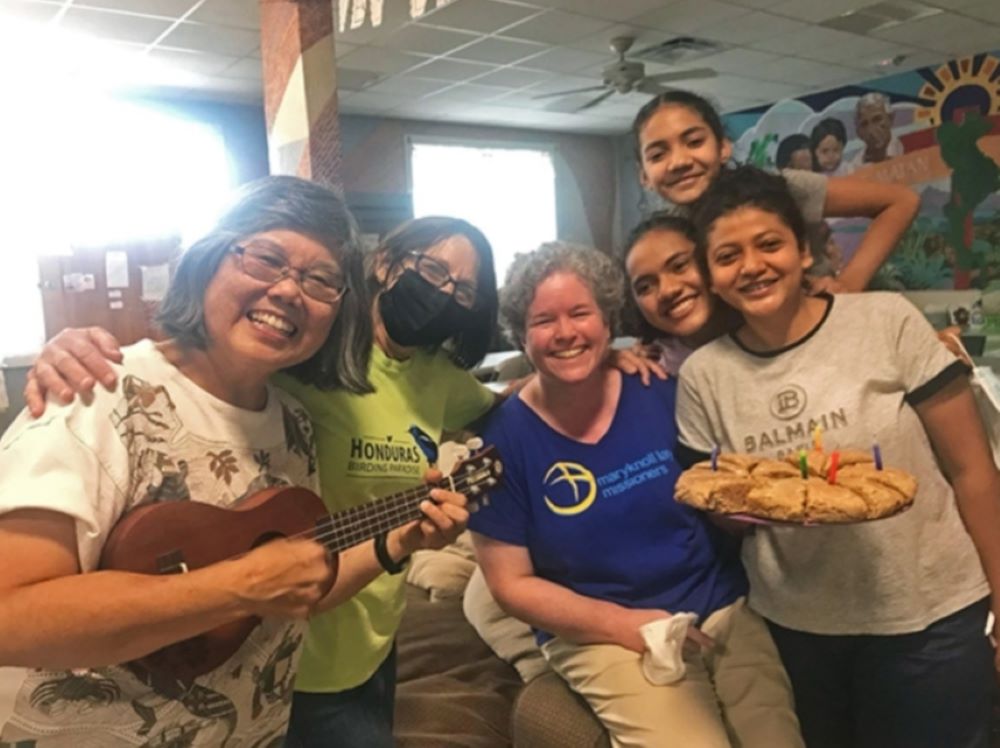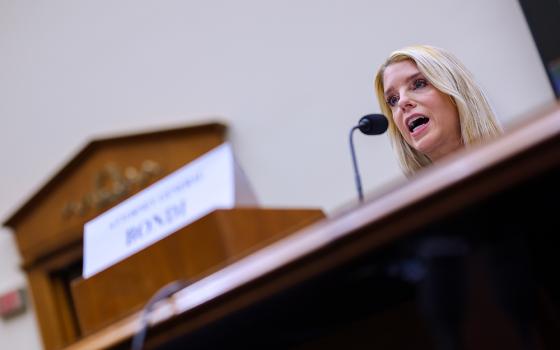
St. Joseph Sr. Deirdre Griffin does one-on-one ministry in El Paso, Texas. She is executive director of the U.S. Federation of the Sisters of St. Joseph. (Courtesy of Deirdre Griffin)
St. Joseph Sr. Deirdre Griffin always knew she was part of something bigger and had something to contribute.
As a member of the Sisters of St. Joseph of Springfield, Massachusetts, and the executive director of the U.S. Federation of the Sisters of St. Joseph, she continues to put that knowledge into action, guiding the union of 16 congregations with more than 2,500 vowed religious, over 2,750 lay associates and five dozen agrégées.
Griffin was born in Cambridge, Massachusetts, and grew up in nearby Medford, part of an Irish immigrant family. She was taught by the Sisters of St. Joseph of Boston through elementary and high school Her experience of women in leadership impressed upon her how women being at the table of authority and decision-making was a normal expectation.
She spent her undergraduate years at Bowdoin College in Brunswick, Maine, earning a bachelor's degree in government and legal studies. She continued her education at Boston College, earning a law degree and becoming an attorney.
Signing on with the Jesuit Volunteer Corps challenged Griffin to live simply and accompany others working on social justice issues. She considered marriage, but then discerned that she would better serve God as part of a community that advocates for the marginalized. She became an agrégée — a non-vowed member of the Sisters of St. Joseph. Then, through her continued relationship with the community, realized that becoming a vowed member was where God was calling her, and how it enlivens her relationship with God and in her ministry. She began that part of her journey in 2018, and professed her final vows in 2023.
Continuing her journey to contribute, Griffin ministered on the U.S.-Mexico border, and became part of the Maryknoll Lay Missioners, who had just formed a community in El Paso, Texas, which complemented her spirituality as a Sister of St. Joseph.
Given her broad experience and training, Griffin was hired as executive director for the U.S. federation and began that position in September.
GSR: What experiences inspired/taught you to pursue service to God's people through social justice initiatives?
Griffin: My theology and ethics education in high school introduced me to the work for social justice inherent in the life and preaching of Jesus, as well as to the complexities of living our Catholic values of nonviolence and the primacy of conscience in our church and in the world.

St. Joseph Sr. Deirdre Griffin, center, poses with members of the ministry team at Casa Vidas in El Paso, Texas. Griffin spent 3.5 years ministering on the U.S.-Mexico border. (Courtesy of Deirdre Griffin)
To be Catholic is not to ascribe to a checklist of litmus tests; it is to enter into the reality of our lives in the company of Christ, moment by moment, to enter into communion both at church and in our neighborhoods. This foundation of knowing our Catholic faith as a dynamic invitation to build up God's active inclusive love in the world has been both a touchstone and inspiration throughout my life.
At Bowdoin College, I entered the breadth of the world in a new way as I ventured out from my deeply rooted childhood into a wider world of tremendous diversity of ideas, identities, economic wealth and religious traditions.
… After college, my experience as a Jesuit volunteer whet my appetite for religious life. Living simply in faith-based community and accompanying our neighbors in the work for justice was energizing and healthily challenging for me. It was an opportunity to know through direct experience that we have choices about how we spend our lives.
In 2008, my work as operations manager with the interpreters in the Massachusetts courts took me to Western Massachusetts, where I lived with the Sisters of St. Joseph of Springfield in a neighborhood house called The Gray House. A group of three sisters lived upstairs and the ministry center downstairs includes adult education classes, English classes, an afterschool program for neighborhood children and a food pantry. Intentional discernment, personally and in community, over time, led to my becoming a vowed member of the Springfield congregation.
How did your experiences lead you to the U.S.-Mexico border?
Following my ministry at The Gray House, I served as the director of a refugee resettlement program in Western Massachusetts, and then with the International Students office at the College of Our Lady of the Elms, which was founded by our congregation.
St. Joseph Sr. Deirdre Griffin (third from left) with a group of younger Sisters of St. Joseph in the United States and Canada (Courtesy of Deirdre Griffin)
As we were reopening our study abroad programs after the initial closure during the COVID pandemic, I felt a strong call to serve at the U.S.-Mexico border. I discerned with the leadership of our community and was missioned to the border. Maryknoll Lay Missioners had just started a new mission community in El Paso, Texas, and, as grace would have it, it worked out for me to join them for a 3.5-year commitment there.
For me, the Maryknoll passion for cross-cultural mission is lived out with a freedom and agility that complemented the deep rootedness of my identity as a Sister of St. Joseph. Being in the company of Maryknoll lay missioners, sisters and priests in El Paso invited me to experience the mysticism of service, or what Pope Francis referred to as "the joy of the Gospel" in new ways amidst the heartbreaking circumstances of accompanying people seeking safety at the border. I am more alive as a Sister of St. Joseph because of my time with Maryknoll.
My discernment about going to the border also included entering into the evolution of religious life in the United States. As we live into the reality of smaller numbers of sisters in our congregations, we are invited anew in this time to determine how to live out our vocation as the prophetic dimension of the institutional church. There are sisters from many congregations in El Paso, and we all work together in welcoming and accompanying people who are arriving there.
What are your greatest challenges working with immigrants at the present time?
Accompanying people recently arrived in the United States is always a humbling experience for me, both because it keeps my eyes open to the many barriers public policy puts in the way of a warm welcome, and because I encounter Christ in both the struggles and the resurrections of people who have suffered so much that they decide they must leave their homes.
Personally, the greatest challenge is also an invitation — to awaken more and more people in the United States, including our church, to concrete actions of hospitality in our own hearts, lives and homes. The support of government programs is very important, but when they are absent, the Gospel call to be God's radical hospitality in the world shines through with invitations for all of us.
How does the prayer style of the Sisters of St. Joseph help ground you in your ministry?
Our spirituality is rooted in the Ignatian dynamic of being "contemplatives in action," so that the love of God that we experience in our personal and communal prayer and at Mass is brought into our quality of presence and ministries each day. We then share and reflect together on our experiences of God in our daily lives, so as to discern what God and our neighbors are asking of us in each moment. This prayer practice is called "Sharing the State of the Heart."
It is a very simple, portable, and integrative practice. This kind of reflection in community keeps me grounded in my own humanness and animated in community and ministry. Ours is a eucharistic spirituality, which invites us to encounter Christ in every interaction.
Advertisement
Were you surprised when you were invited to serve as the executive director of the federation?
One of the gifts of living as a Sister of St. Joseph is a commitment to a shared attentiveness and responsiveness to the movements of grace, which requires a commitment to ongoing discernment. This creates what I think of as a dance between the "I" of my personal vocation and the "we" of our life in the 16 congregations that comprise our U.S. federation.
I was fully engaged in a vibrant life and ministry at the U.S.-Mexico border when this process began, and my initial reaction was that I had no reason to leave there. When I sat with God in openness to discernment, however, it became clear to me that this was an invitation to serve the "we" of this life that I cherish, so that we can engage this time as Sisters of St. Joseph in the United States as fully as possible, together.
What are your plans for moving the federation into the future?
The federation is a voluntary association of all 16 congregations of Sisters of St. Joseph in the United States who share a common founding in Le Puy, France, in 1650. Our collaborative mission is to support one another in living our charism of God's unifying love, continuing the mission of Jesus in our church and world today. … At this time, when so many people are seeking community and to deepen their spiritual lives, I see an invitation to share our spirituality with more and more people.
Our call of "connecting neighbor with neighbor and neighbor with God, without distinction" is a way forward through the anxieties and violence of the times in which we are living. This has been true since our founding in war-torn France and is a down-to-earth expression of the mission of Jesus that is accessible for us today.





